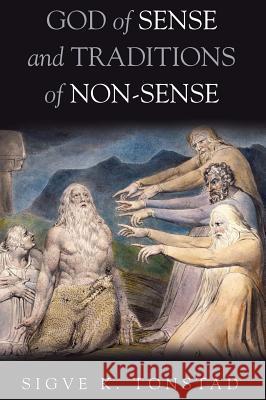God of Sense and Traditions of Non-Sense » książka
God of Sense and Traditions of Non-Sense
ISBN-13: 9781498233156 / Angielski / Twarda / 2016 / 476 str.
God of Sense and Traditions of Non-Sense
ISBN-13: 9781498233156 / Angielski / Twarda / 2016 / 476 str.
(netto: 191,86 VAT: 5%)
Najniższa cena z 30 dni: 198,67
ok. 16-18 dni roboczych.
Darmowa dostawa!
One hundred taxis lined up on Church Street in Oslo on November 26, 1942, deployed in order to round up the city's Jews and send them to Auschwitz. This reality anchors God of Sense and Traditions of Non-Sense: it is theology from a Holocaust perspective. The brash Elihu excoriating Job for his insistence that he is owed an explanation for the calamities that have befallen him. This is the book's opening salvo. Job speaking of a God of sense, Elihu and Job's three friends inaugurating a tradition of non-sense: this is the existential and theological predicament. The problem of finite suffering in this life addressed in the theological tradition with the prospect of infinite, endless suffering, in this book described as a key element in Traditions of Non-Sense. Back to the millions of Jews, among them 188 women and 42 children from Oslo, deported, gassed, and cremated--in God of Sense this is not seen as a problem that defeats belief, but as the reality that demands a religious and theological account of human existence. --In God of Sense and Traditions of Non-Sense, Sigve Tonstad displays a masterful and nuanced command of theological complexities with regard to the thorny matrix of evil, suffering, and God. Probing key resources of the Judeo-Christian tradition for their import in a post-Holocaust situation, Tonstad articulates fresh perspectives deriving from his unique expertise in the medical, theological, and biblical disciplines. This beautifully-written book is a welcome contribution to Christian theological discourse on a burning issue.-- --Bruce W. Longenecker, Melton Chair of Religion, Baylor University --Tonstad writes with passion, eloquence, and fresh insight, including the notion that dissent is a prerequisite for an open society and the precondition for better theology. This is a book for our time--a time of doubt and unbelief; it shows how the Bible has resources with which to capture the experience of suffering from within, how the New Testament makes sense in a time of non-sense, and how story after biblical story offers glimpses of 'sense.'-- --Lawrence T. Geraty, President Emeritus, Executive Director, Foundation, La Sierra University Sigve K. Tonstad is professor of biblical interpretation at Loma Linda University in California. He completed medical school and a residency in internal medicine at Loma Linda University and a PhD in New Testament studies at the University of St. Andrews. He is the author of Saving God's Reputation (2006), a book dealing with the question of theodicy. Among courses in his teaching portfolio are God and Human Suffering.
One hundred taxis lined up on Church Street in Oslo on November 26, 1942, deployed in order to round up the citys Jews and send them to Auschwitz. This reality anchors God of Sense and Traditions of Non-Sense: it is theology from a Holocaust perspective. The brash Elihu excoriating Job for his insistence that he is owed an explanation for the calamities that have befallen him. This is the books opening salvo. Job speaking of a God of sense, Elihu and Jobs three friends inaugurating a tradition of non-sense: this is the existential and theological predicament. The problem of finite suffering in this life addressed in the theological tradition with the prospect of infinite, endless suffering, in this book described as a key element in Traditions of Non-Sense. Back to the millions of Jews, among them 188 women and 42 children from Oslo, deported, gassed, and cremated--in God of Sense this is not seen as a problem that defeats belief, but as the reality that demands a religious and theological account of human existence.""In God of Sense and Traditions of Non-Sense, Sigve Tonstad displays a masterful and nuanced command of theological complexities with regard to the thorny matrix of evil, suffering, and God. Probing key resources of the Judeo-Christian tradition for their import in a post-Holocaust situation, Tonstad articulates fresh perspectives deriving from his unique expertise in the medical, theological, and biblical disciplines. This beautifully-written book is a welcome contribution to Christian theological discourse on a burning issue.""--Bruce W. Longenecker, Melton Chair of Religion, Baylor University""Tonstad writes with passion, eloquence, and fresh insight, including the notion that dissent is a prerequisite for an open society and the precondition for better theology. This is a book for our time--a time of doubt and unbelief; it shows how the Bible has resources with which to capture the experience of suffering from within, how the New Testament makes sense in a time of non-sense, and how story after biblical story offers glimpses of sense.""--Lawrence T. Geraty, President Emeritus, Executive Director, Foundation, La Sierra UniversitySigve K. Tonstad is professor of biblical interpretation at Loma Linda University in California. He completed medical school and a residency in internal medicine at Loma Linda University and a PhD in New Testament studies at the University of St. Andrews. He is the author of Saving Gods Reputation (2006), a book dealing with the question of theodicy. Among courses in his teaching portfolio are God and Human Suffering.











